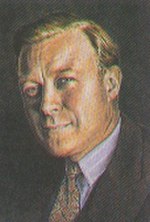Walter Reuther, Date of Birth, Place of Birth, Date of Death
TweetWalter Reuther
Labor union leader
 Date of Birth: 01-Sep-1907
Date of Birth: 01-Sep-1907
 Place of Birth: Wheeling, West Virginia, United States
Place of Birth: Wheeling, West Virginia, United States
Date of Death: 09-May-1970
Profession: politician, trade unionist
Nationality: United States
Zodiac Sign: Virgo 
About Walter Reuther
- Walter Philip Reuther (; September 1, 1907 – May 9, 1970) was an American leader of organized labor and civil rights activist who built the United Automobile Workers (UAW) into one of the most progressive labor unions in American history.
- He saw labor movements not as narrow special interest groups but as instruments to advance social justice and human rights in democratic societies.
- He leveraged the UAW's resources and influence to advocate for workers' rights, civil rights, women's rights, universal health care, public education, affordable housing, environmental stewardship, nuclear nonproliferation, and democratic trade unionism around the world.
- He survived two attempted assassinations, including one at home where he was struck by a 12-gauge shotgun blast fired through his kitchen window.
- He was the fourth and longest serving president of the UAW, serving from 1946 until his untimely death in 1970.A powerful ally of Martin Luther King, Jr.
- and the civil rights movement, Reuther marched with King in Selma, Birmingham, Montgomery, and Jackson.
- When King and others including children were jailed in Birmingham, Alabama, and King authored his famous Letter from Birmingham Jail, Reuther arranged $160,000 for the protestors' release.
- He also helped organize and finance the March on Washington on August 28, 1963, delivering remarks from the steps of the Lincoln Memorial shortly before King gave his historic "I Have a Dream" speech on the National Mall.
- He served on the board of directors for the National Association for the Advancement of Colored People (NAACP) and was one of the founders of Americans for Democratic Action.
- An early supporter of Cesar Chavez and the United Farm Workers, he asked Robert F.
- Kennedy to visit and support Chavez.
- A lifetime environmentalist, Reuther played a critical role in funding and organizing the first Earth Day on April 22, 1970.
- According to Denis Hayes, the principal national organizer of the first Earth Day, "Without the UAW, the first Earth Day would have likely flopped!"As the leader of five million autoworkers including retirees and their families, Reuther was influential inside the Democratic Party.
- During World War II, President Franklin D.
- Roosevelt frequently consulted Reuther, referring to him as "my young red-headed engineer." He was considered by John F.
- Kennedy for Vice President in 1960.
- Following the Bay of Pigs in 1961, JFK sent Reuther to Cuba to negotiate a prisoner exchange with Fidel Castro.
- He was instrumental in spearheading the creation of the Peace Corps and in marshaling support for the Civil Rights Act of 1964, the Voting Rights Act of 1965, Medicare and Medicaid, and the Fair Housing Act.
- He met weekly in 1964 and 1965 with President Lyndon B.
- Johnson at the White House to discuss policies and legislation for the Great Society and War on Poverty.
- The Republican Party was wary of Reuther, leading presidential candidate Richard Nixon to say about John F.
- Kennedy during the 1960 election, "I can think of nothing so detrimental to this nation than for any President to owe his election to, and therefore be a captive of, a political boss like Walter Reuther." Conservative politician Barry Goldwater declared that "[Reuther] was more dangerous to our country than Sputnik or anything Soviet Russia might do."Reuther was posthumously awarded the Presidential Medal of Freedom in 1995 by President Bill Clinton, who remarked at the ceremony, "Walter Reuther was an American visionary so far ahead of his times that although he died a quarter of a century ago, our Nation has yet to catch up to his dreams." Reuther was recognized by Time Magazine as one of the 100 most influential people of the 20th century.
- Murray Kempton, a Pulitzer Prize-winning journalist, wrote, "Walter Reuther was one man who could reminisce about the future." A.
- H.
- Raskin, labor editor of The New York Times, wrote, "If the speed of a man's mind could be measured in the same way as the speed of his legs, Walter Reuther would be an Olympic champion." George Romney, Governor of Michigan, once said, "Walter Reuther is the most dangerous man in Detroit because no one is more skillful in bringing about the revolution without seeming to disrupt the existing forms of society."
Read more at Wikipedia
See Also
- Famous People's Birthdays on 01 September, United States
- Famous People's Birthdays in September, United States
- Famous politician's Birthdays on 01 September, United States
- Famous politician's Birthdays in September, United States
- Famous trade unionist's Birthdays on 01 September, United States
- Famous trade unionist's Birthdays in September, United States

